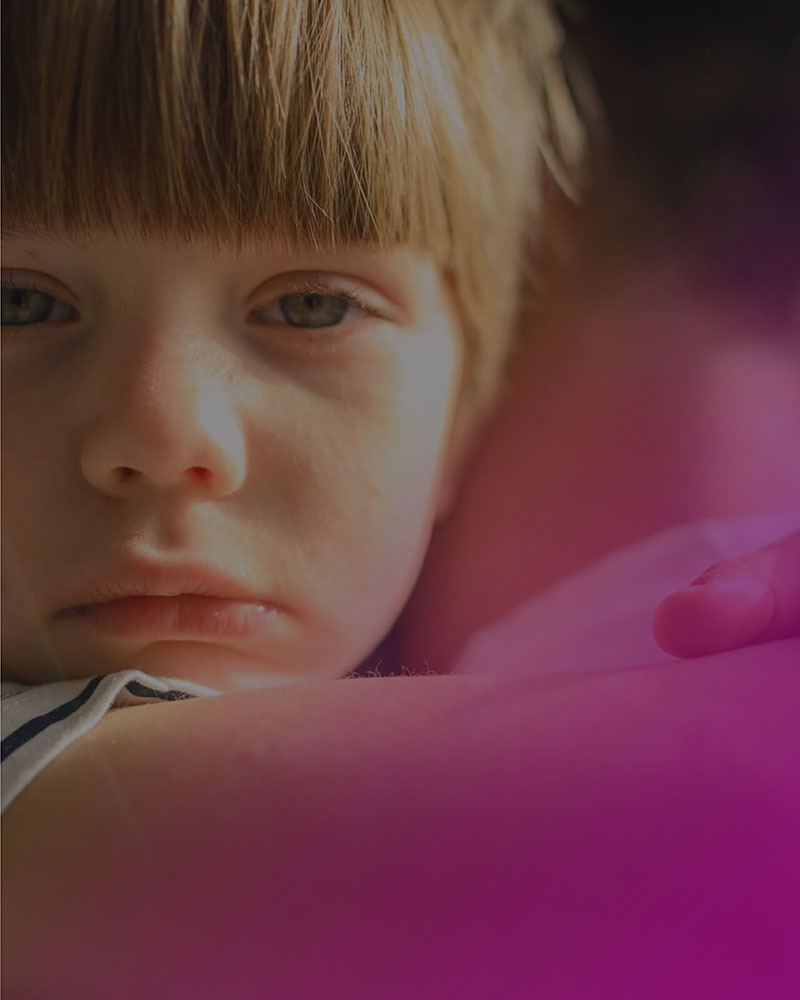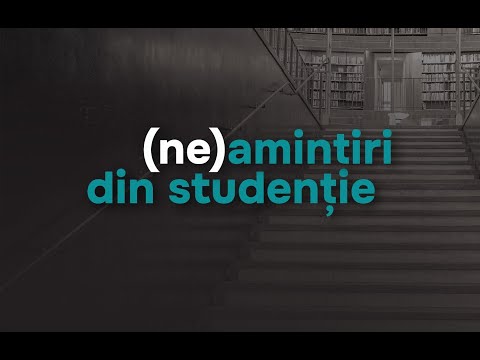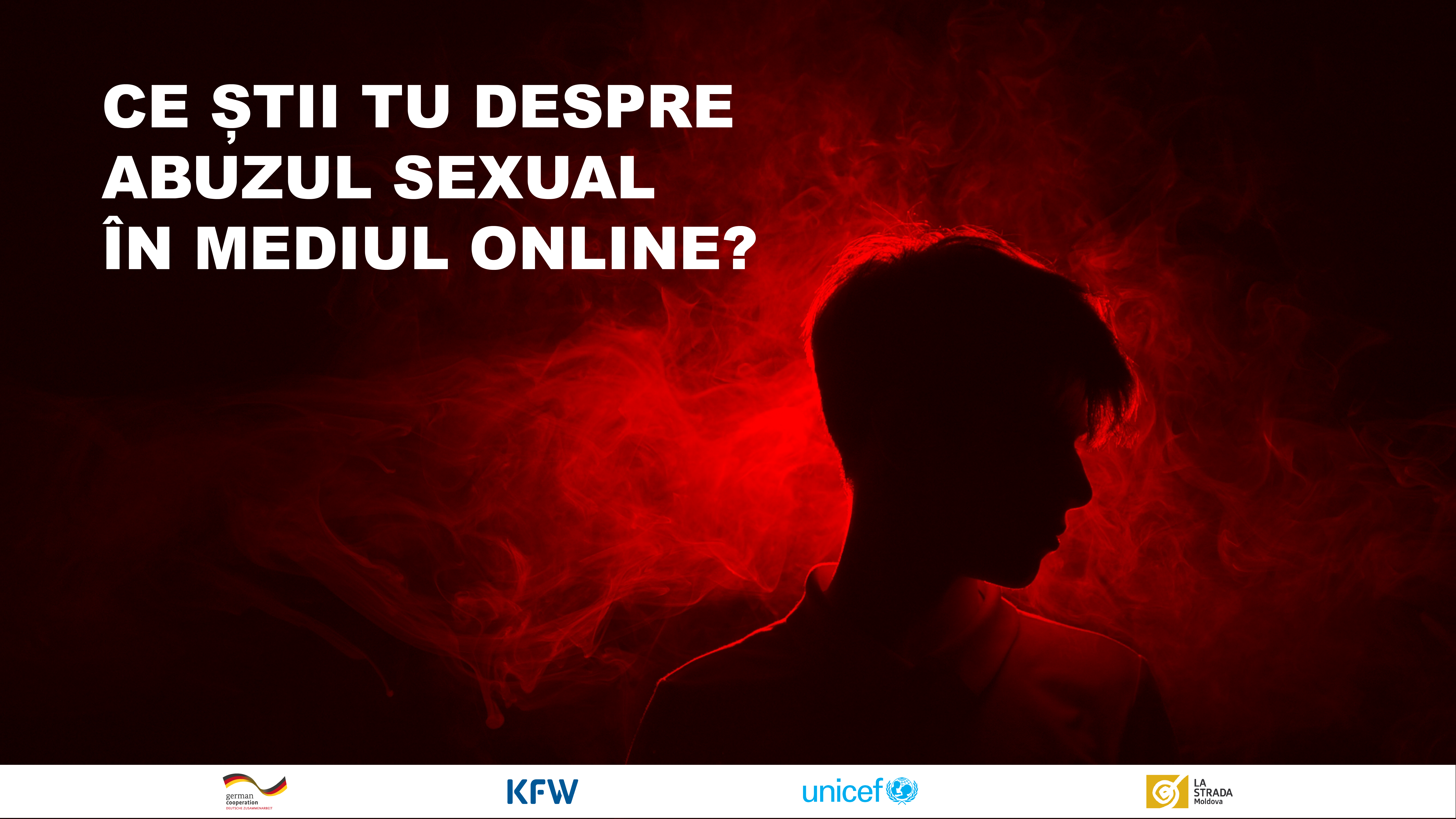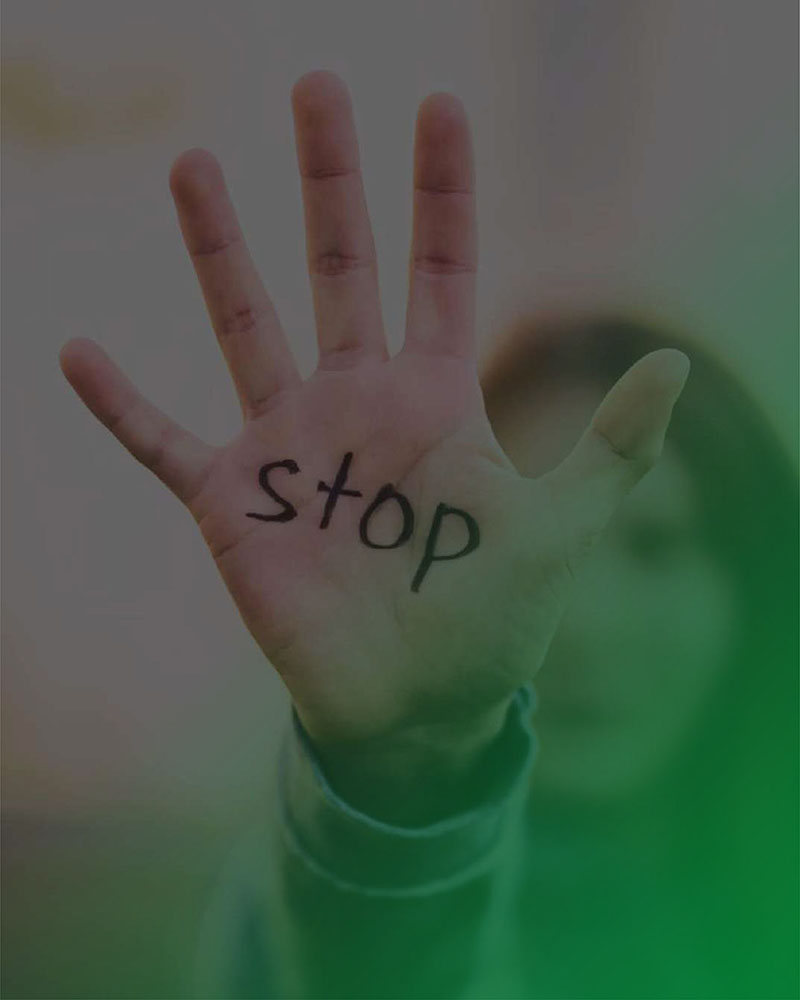
0
years of activity
0
victims of abuse, assisted by "La Strada" specialists
0
beneficiaries of support and counseling
0
research, studies and public policy analysis
0
professionals trained annually
Media
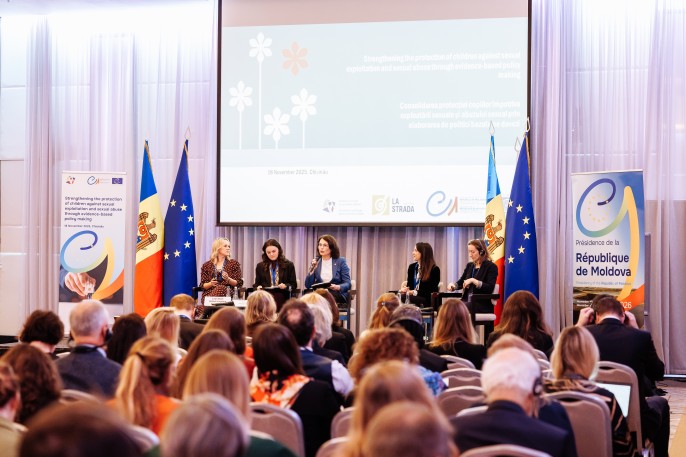
The International Conference on the Protection of Children against Exploitation and Sexual Abuse is taking place in Chișinău
On 18 November, the Council of Europe Office in Chișinău, the Ministry of Internal Affairs, and the Ministry of Labour and Social Protection, in partnership with the International Center La Strada, organized the International Conference “Strengthening the Protection of Children against Exploitation and Sexual Abuse through Evidence-Based Policy Making.” The event marked the European Day on the Protection of Children against Sexual Exploitation and Sexual Abuse, launched in 2015 by the Council of Europe to raise public awareness and highlight the importance of preventing this crime, prosecuting offenders, and protecting victims of sexual abuse and exploitation. Organized under the auspices of the Presidency of the Republic of Moldova of the Committee of Ministers of the Council of Europe, the conference brought together senior officials, international experts, and practitioners to discuss how data and evidence can lead to more sustainable child protection policies against exploitation and sexual abuse. Elena Botezatu, Executive Director of the International Center La Strada, moderated the thematic panel “Evidence-Based Policy Making.” Together with international experts, she defined the concept of evidence-based policies, examined what types of data are needed, and how states implement this approach in practice. According to Elena Botezatu, evidence-based policies are the only way to transform identified problems into effective solutions. Data provide not only a realistic picture of phenomena but also the direction in which action must be taken to achieve sustainable and responsible results. The conference included thematic sessions, interactive workshops, and discussions on leveraging data from child protection services, involving survivors in policy development, and strengthening international cooperation to prevent reoffending abroad. Participants were also addressed by the Minister of Internal Affairs of the Republic of Moldova, Daniella Misail-Nichitin; the Minister of Labour and Social Protection, Natalia Plugaru; the Head of the Children’s Rights Division of the Council of Europe, Agnes von Maravić; and the Head of the Council of Europe Office in Chișinău, Falk Lange.
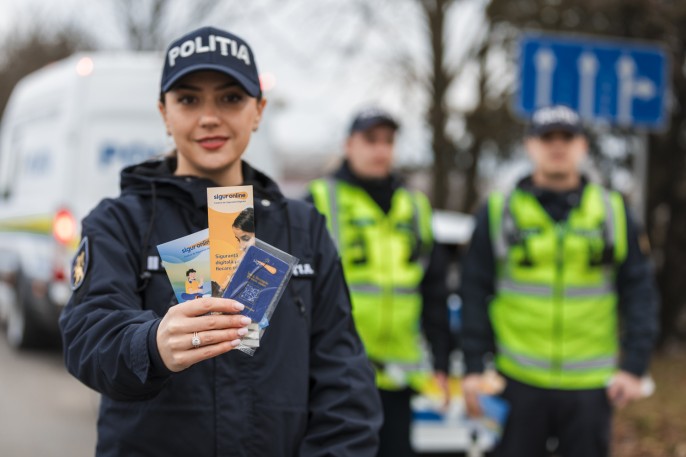
Operation “SafeOnline with the Police” – drivers informed about children’s online safety
As part of the national awareness campaign “Digital Safety for Every Child!”, the Digital Safety Center, in partnership with the General Police Inspectorate, launched today the information initiative “SafeOnline with the Police.” Under this operation, teams from the National Public Security Inspectorate (INSP) stop drivers in traffic to provide messages of responsibility and useful resources on how to protect children in the digital space. Drivers receive informational leaflets for parents, bookmarks, and car air fresheners with key messages about children’s online safety, ranging from responsible internet use to reporting abusive content. The goal of the initiative is to raise awareness among parents, grandparents, and caregivers about the risks of the digital world and to remind them of their role in guiding children toward safe and responsible online behavior. The national campaign “Digital Safety for Every Child!” is organized by the International Center “La Strada” through the Digital Safety Center, in partnership with the Ministry of Labor and Social Protection, Ministry of Education and Research, Ministry of Economic Development and Digitalization, Ministry of Internal Affairs, Ministry of Health, the General Police Inspectorate, and the International Organization for Migration (IOM), with support from the Global Partnership Fund to Stop Violence Against Children – Safe Online. The campaign aims to promote the only specialized service in the Republic of Moldova dedicated to managing digital risks for children and youth – www.siguronline.md – as well as the free telephone assistance service for children 116 111 (www.telefonulcopilului.md). According to data from the Digital Safety Center, in the first half of 2025 alone, there were: 237 reports on the platform www.siguronline.md regarding various online challenges faced by children; 1,246 reports of child sexual abuse material (CSAM) hosted on servers in the country; and 2,105 illegal materials removed in partnership with the police and service providers, of which one in three involved severe content depicting children under 13. Among the most alarming trends are the rise of cyberbullying, the decreasing age of children involved in abusive materials, the sharing of intimate images for defamation, and parents’ lack of awareness about setting healthy boundaries for technology use. The “Digital Safety for Every Child!” campaign runs from September to November 2025 and includes activities in schools, public awareness spots, training sessions for parents and professionals, and distribution of educational materials in bookstores, youth-friendly centers, and healthcare institutions. Through these initiatives, partners aim to strengthen a culture of digital safety among children, parents, and professionals, contributing to a safer and more responsible online society.

The members of multidisciplinary teams across the country have strengthened their skills in managing cases of online sexual abuse against children.
125 child protection professionals and community social workers – members of multidisciplinary teams from across the country – have strengthened their professional competencies in the multidisciplinary approach to cases of online sexual abuse of children. The training sessions took place during October and November of this year, within five dedicated workshops, bringing together members of local and district multidisciplinary teams from all regions of the country. Participants enhanced their capacities through updated knowledge, practical tools, and concrete examples of intervention in cases of online sexual abuse. Throughout the sessions, participants explored the various forms of online sexual violence affecting children, analyzed the necessary steps for an effective intervention, and reaffirmed the importance of inter-institutional cooperation. Trainers emphasized the practical aspects of intervention, provided space for reflection and exchange of best practices among team members, and focused on developing a coordinated, prompt, and empathetic response to support child victims of online sexual abuse—thus contributing to their real and sustainable protection. At the opening of the training, Anastasia Gruzin, Deputy Head of the Child and Family Rights Protection Policy Department of the Ministry of Labour and Social Protection, highlighted the importance of inter-institutional collaboration and the need for a prompt and empathetic response to support children who are victims of online abuse. She also commended the initiative of the International Center “La Strada” for organizing such workshops. In turn, Veronica Maevschi, Director of the Children’s Program of the International Center “La Strada,” noted that the organizers aimed to contribute to the development of a coherent and sustainable multidisciplinary response to ensure the real protection and recovery of children following traumatic experiences. “1 in 2 children are involved in sharing sexually explicit images in online communication. 2 in 7 children are threatened with intimate images by someone online. 1 in 5 children do not know how to react in a situation of online violence. 1 in 10 children are exposed to online harassment. 1 in 3 children have had their reputation compromised through sexualized images. In 100% of reported cases of online sexual abuse, the victims are girls—50% of them aged 16–18. Boys aged 13–15 are more vulnerable to sexual abuse occurring in online games,” said Veronica Maevschi. According to her, since the beginning of its work, the Child Assistance Team of the International Center “La Strada” has provided support in 907 cases of sexual abuse and sexual exploitation. Over the five training days, participants, guided by field experts, addressed key topics such as: Understanding the phenomenon of online sexual abuse of children and its various forms; The intervention of multidisciplinary teams and the specifics of inter-institutional collaboration; The legal framework and the role of the police in investigating online sexual abuse cases; The specific needs of child victims and measures for psychological and social support; Practical procedures for intervention and case management. Participants also had the opportunity to analyze real-life situations, discuss challenges encountered in their work, and share good practices for an effective and coordinated response. The practical component of the workshops—encouraging experience sharing and peer learning—was highly appreciated by attendees. At the end of the sessions, participants described the training as a valuable experience that helped clarify the roles of each institution in the intervention process and improved communication among professionals. “Cases of online sexual abuse are becoming increasingly complex and require a coordinated response. During the workshop, we gained a better understanding of how to collaborate effectively with the police, schools, and social services to protect the child without causing further trauma” said one of the social workers. Many participants emphasized that the training helped them better understand the emotional impact of online abuse on children and the importance of early and empathetic intervention. Five similar workshops had already been held in May of this year. In total, 250 professionals have now been trained in managing cases of online sexual abuse of children. The sessions were organized by the International Center “La Strada Moldova”, in partnership with the Ministry of Labour and Social Protection of the Republic of Moldova, with the support of the Global Partnership to End Violence Against Children – Safe Online initiative.
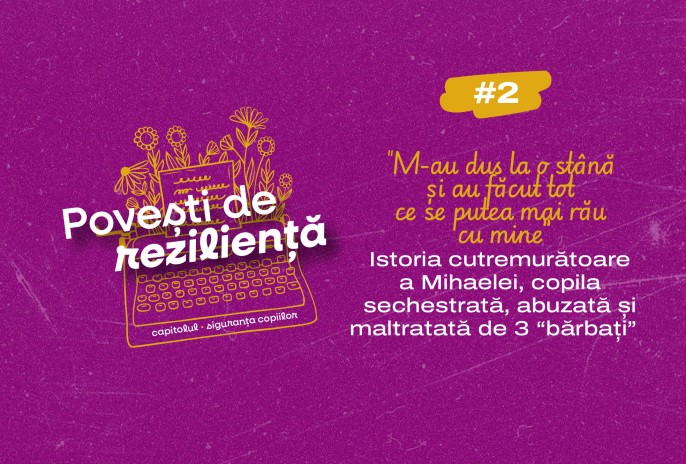
Stories of Resilience #2 | “They took me to a sheepfold and did every horrible thing imaginable to me. The only thing they didn’t do was let me die.” — The harrowing story of Mihaela, the child who was kidnapped, abused, and tortured by three so-called ‘men’.
I’m tired. So very tired. It’s not the first time I’ve felt like there’s no place in this world for me. I know that thought isn’t fair, but it’s always there — especially when I think back to those years that were stolen from me, piece by piece. This October cold reminds me of those nights when the wolves came for the sheep. I don’t even know why I always make that comparison — it’s just how I felt. I was the sheep. They were the wolves. Only, unlike the sheep, I didn’t have a shepherd to protect me. I was alone. Completely alone. Now I’m here, wrapped in a blanket, sitting in a warm, quiet room. But inside me, it still rains. It doesn’t go away, no matter how hard I try. And it hurts — differently now, but it still hurts. I never thought I’d be able to talk about it. Every time I close my eyes, I go back there — to that place, in the cold, left alone, my screams vanishing into the night. He had hurt me before, but back then I was too young to understand. He knew I had no one. My mother worked wherever she could, and exhaustion — and the drinking — made her forget she even had a child. My father was gone. He took advantage of that, again and again. He beat me until I could barely move. I was just a body that breathed. He’d snap over nothing, turn into a monster the moment he saw me. I still remember the numbness, the metallic taste of blood… and the moment he dragged me toward the car. He took me to a remote sheepfold. And there, he and others like him did unspeakable things to me. They didn’t let me die — that was the only mercy. For two weeks, I lived through hell — forced to work by day and endure unimaginable pain by night. I didn’t know if I’d live to see the next morning. I learned only to survive — and to stay silent. Somehow, I escaped. I don’t even know how. If I had stayed one more night, I don’t think I’d be alive today. But he found me again, later. And once more, the torment started — this time with others, laughing, humiliating, destroying what was left of me.I know what hell looks like. Sometimes it lives inside people who prey on your weakness. I felt it on my skin. But I don’t want to talk about him anymore. I’m tired of telling that story. I want to tell mine. Because now, I’m okay. Someone heard what happened to me. Someone cared. You see, my mother’s drinking cost her the right to be my guardian. A stranger — a woman with kind eyes — told the police about me. I think God sent her. She said she was part of an “assistance team.” [1]. I didn’t know what that meant, but she and her colleague were the first people who showed me that the world still had gentle hearts. They took me to a safe place. I cried when I saw it — quiet, warm, clean. At first, the silence scared me. It was too foreign. They offered me tea, asked me questions, told me I could speak freely. And as I spoke, it felt like the air itself was tearing apart from the weight of my words. During the hearing, I told everything. Every word felt like being torn open. But I knew I had to speak — for justice, and for myself. The process was long and painful, but those women — my psychologist and my lawyer, I later learned — stayed by my side. They helped me heal, piece by piece. Eventually, I was moved to a special center, a safe home. The women there helped me rebuild myself, to trust again, to believe I deserved peace. I thank God every day for them. At the Center, I’ve learned new things, rediscovered myself, and found kindness again. I took a makeup course, and now I’m planning to go to vocational school to become a chef. The staff believe in me — and slowly, I’ve started to believe it too. I’ve started to believe that I am more than what was done to me. A few months ago, in March, justice was served. The three men who destroyed my childhood were sentenced to long prison terms — one for 19 years, the others for 25. It doesn’t erase what happened, but at least I know they can’t hurt anyone else. My name is Mihaela. This is my story of resilience. If you’ve read this far, please consider supporting the Assistance Team that helped me — and continues to help other children like me find justice and safety. Your contribution will help the psychologist who still visits me, helping me grow into an adult who lives without fear, in safety, with confidence, and hope. Note: This story is based on real events. [1] The Child Assistance Team (EAC) operates within the International Center “La Strada.”


